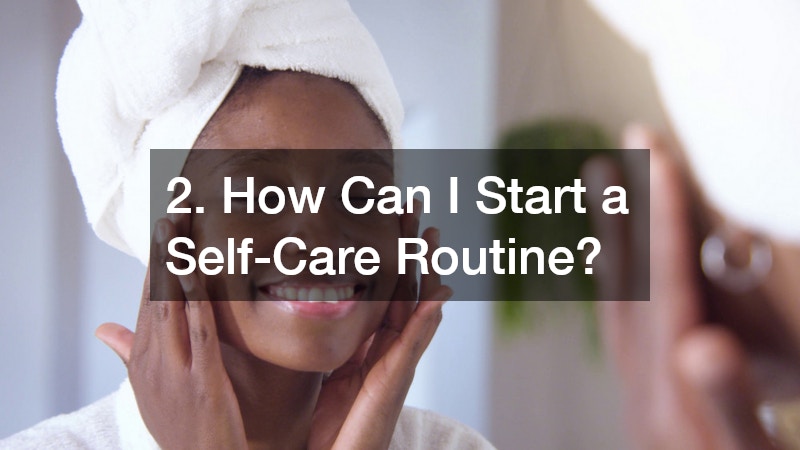This article is designed to guide you through the initial steps of your self-care journey, providing simple and effective ways to enhance your overall well-being. Self-care is more than just a trend; it’s a necessary practice in maintaining a healthy and balanced life. By prioritizing self-care, you can improve your mental and physical health, increase your resilience, and enrich your life experiences.
1. What is Self-Care and Why is it Important?
Self-care is the practice of taking action to preserve or improve one’s own health. This is especially pertinent today, where burnout and stress are commonplace. Health and wellness coaches often emphasize the importance of a robust self-care journey to prevent occupational burnout.
The self-care journey focuses on holistic well-being, encompassing emotional, physical, and mental health. It’s not just about indulgence but about making choices that lead to overall healthier living. This can include regular check-ups with specialists like a cardiology specialist for heart health or an eye doctor for vision maintenance.
One’s self-care journey is critical to maintaining life balance and ensuring personal affairs do not interfere with emotional well-being. It is through understanding its importance that individuals can effectively incorporate various strategies to nurture their body and mind. Health and wellness coaches provide guidance on maintaining this important routine.
2. How Can I Start a Self-Care Routine?

Embarking on a self-care journey involves starting small and building consistent habits that enhance well-being. Personal health monitoring devices can assist in keeping track of your fitness and health stats, making it easier to understand your physical state. Creating a self-care routine should align with your personal needs, gradually introducing new habits based on what suits you.
Consider embarking on your self-care journey by integrating simple activities like regular exercise, a balanced diet, and quality sleep. These activities lay the foundation for more intricate self-care practices as you develop. Health and wellness coaches suggest starting with what motivates you personally.
While beginning, be patient and flexible with your self-care journey. It is perfectly normal for routines to evolve and adapt to life changes. Use feedback from personal health monitoring devices to tweak your routine in the most beneficial way possible.
3. What Are Some Simple Self-Care Practices I Can Try?
There are numerous simple self-care practices you can embrace in your journey. Practices like meditation and controlled breathing can substantially enhance mental clarity and reduce stress. If you prefer more physical activities, chiropractic adjustment is worth considering to alleviate tense muscles and aid in maintaining spinal health.
Moreover, setting aside time for quiet reflection or engaging in a hobby can serve as passive self-care, benefiting mental well-being. Beyond individual activities, routine appointments like teeth cleaning can ensure you maintain a healthy smile, critical for self-confidence and long-term oral health. Self-care practices should be enjoyable and stress-relieving, enhancing your journey.
Whatever the activity, it should suit your preferences and fit into your lifestyle. Experiment with different activities and pay attention to what feels enriching and fulfilling. Consistency in these practices will significantly improve your self-care journey over time.
4. How Can I Improve My Mental Health through Self-Care?

Mental health is a critical component of the self-care journey. Practices such as mindfulness meditation can greatly relieve anxiety and improve focus. In some cases, supplemental treatments like peptide therapy, which promotes mood regulation, are beneficial.
Developing a hobby or passion can also profoundly uplift your mental state. These activities provide distraction and can be therapeutic, offering a much-needed break from stress. Moreover, conversations with health and wellness coaches can ensure your self-care practices are supporting your mental health goals.
Building a support network can serve as emotional reinforcement during challenging times. Regular communication with friends and loved ones provides essential emotional support. The self-care journey is enriched by relationships that add value and encouragement.
5. What Role Does Sleep Play in Self-Care?
Quality sleep is essential in the self-care journey, affecting both mental and physical health. It is during sleep that the body repairs, rejuvenates, and processes the day’s events. Hormone replacement treatment can aid those with hormonal disorders that impact sleep quality, ensuring you receive proper rest.
Establishing a regular sleep routine can greatly enhance entrepreneurial capabilities and cognitive functions. A comfortable sleep environment, along with consistent bedtime and wake-up times, are key components. By making sleep a priority, other self-care practices naturally become more effective and beneficial.
Developing good sleep hygiene—such as limiting screen time before bed and maintaining a cool, dark bedroom—ensures better quality rest. These practices are simple yet incredibly effective in boosting energy levels and enhancing mood. Improved sleep will propel your self-care journey forward, offering the energy needed to handle life’s demands.
6. How Can I Incorporate Self-Care into a Busy Schedule?

The challenge for many in the self-care journey is finding time within busy schedules. Prioritizing activities such as quick workouts or brief meditative sessions is essential. Visiting a thyroid therapy clinic can provide insights to effectively manage energy levels and maintain productivity amidst chaos.
Even short-duration activities, when consistently practiced, can make a significant difference. Using personal health monitoring devices can help identify the best times for these activities amidst a packed schedule. Integrating self-care as a regular part of your day ensures you make time for yourself.
Moreover, set realistic goals to avoid feeling overwhelmed. Recognizing that self-care doesn’t require large chunks of time helps alleviate guilt associated with taking breaks. Emphasize quality over quantity in your self-care journey, utilizing any available moment to recharge.
7. How Does Social Interaction Impact My Self-Care Journey?
Human beings are inherently social creatures, and social interaction plays a vital role in the self-care journey. Engaging with others can provide new perspectives and emotional support, most importantly when going through stressful times. Visits to community centers or hobbies groups can offer a constructive environment to meet like-minded individuals.
Regular social interaction has been associated with enhanced mood and reduced feelings of loneliness. Valuable relationships often contribute positively to the self-care journey, buffering stress, and providing emotional scaffolding. Health and wellness coaches often advocate for social activities as a minor yet impactful aspect of overall well-being.
While it is critical to spend time with friends and family, it’s also vital to maintain a balanced approach. Recognizing when to retreat for self-reflection is as crucial as seeking social engagement. Professional help, like a consultation with a cardiology specialist, ensures that overall health—including the heart—is supported and maintained.
8. What Are the Signs That My Self-Care Routine is Working?

Evidence that your self-care routine is effective often manifests subtly over time. Increased energy levels and enhanced mood are key indicators. Regular appointments, such as with your eye doctor or for teeth cleaning, can confirm your physical health remains optimal.
A sense of balance and reduced stress levels signify that self-care practices are positively impacting your life. Improved relationships and clarity in decision-making also indicate alignment and focus, thanks to consistent self-care. These signs show that your self-care journey is both reactive to stress and proactive in fostering good health.
Your body and mind will also exhibit enhanced resilience and vitality, enabling you to tackle daily challenges more effectively. Over time, you’ll notice greater emotional stability and consistent focus. A positive self-care journey aligns closely with the experiences of personal growth and satisfaction.
9. How Can I Maintain Consistency in My Self-Care Practices?
Consistency within your self-care journey fosters habit formation and long-term benefits. First, establish specific self-care goals that motivate and inspire. Scheduling regular health check-ups, such as a dental cleaning appointment, can maintain accountability for both mental and physical well-being.
Make self-care a non-negotiable part of your routine, treating it as you would any other important appointment. Recognize self-care as a personal investment, rather than a luxury. Tracking progress, perhaps with personal health monitoring devices, will help visualize the value these routines add to your daily life.
Life is inherently dynamic, marked by continuous shifts and evolving circumstances. Within this ever-changing landscape, the consistent practice of self-care remains a vital anchor for well-being. It is crucial to recognize that your self-care routine, while foundational, should not be rigid or resistant to these natural life transitions. Instead, view your self-care practices as adaptable tools that can be modified and adjusted to effectively meet your current needs and align with your prevailing lifestyle.
Periodically taking the time to re-evaluate your self-care routine is not a sign of failure or inconsistency, but rather an act of proactive self-awareness. As your responsibilities, relationships, health, and overall circumstances shift, what once provided effective nourishment and rejuvenation may no longer be as relevant or impactful. This process of re-evaluation allows you to identify aspects of your routine that are still serving you well, as well as areas where adjustments or additions might be beneficial.
10. What Resources are Available for Further Guidance on Self-Care?
Embarking on a self-care journey can seem daunting, but numerous resources are available for guidance. Books and online courses provide foundational insights and varied perspectives on self-care. Consulting with health and wellness coaches can offer personalized advice tailored to individual needs.
Support groups and community classes also present opportunities to learn and grow within a supportive environment. Interested individuals may also benefit from professional evaluations, like visiting a thyroid therapy clinic for specialized advice. Utilizing these resources can empower individuals to construct a unique and effective self-care plan.
Engaging in routine healthcare appointments forms a cornerstone of proactive self-care. Just as we maintain our vehicles with regular servicing, our bodies benefit immensely from consistent professional attention. Simple yet vital engagements, such as biannual dental cleaning appointments, go beyond mere aesthetics. These check-ups play a crucial role in preventing the onset and progression of oral health issues, which can have systemic implications for overall well-being. Similarly, scheduling regular visits with specialists, like an eye doctor for comprehensive examinations, allows for the early detection and management of potential vision problems, safeguarding a critical sensory function that impacts daily life.
These routine engagements underscore a fundamental principle of self-care: prioritizing preventive measures to sustain long-term health and vitality. By proactively seeking professional care, individuals invest in their future well-being, mitigating the risk of more serious health concerns that may arise from neglect. This dedication to regular check-ups demonstrates a commitment to self-awareness and a responsible approach to health management.
The journey of self-care is continuously enriched by the pursuit of knowledge and the guidance of healthcare professionals. Seeking expert advice empowers individuals to make informed decisions about their health and well-being. Continuously learning about health-related matters and adapting one’s self-care practices based on current understanding reflects the dynamic and evolving nature of self-care. As our understanding of health and wellness advances, so too should our approaches to maintaining it. Embracing this continuous learning process ensures that our self-care strategies remain relevant, effective, and aligned with the latest insights, ultimately leading to a more fulfilling and healthier life.
The pursuit of self-care represents a deeply personal and continuously evolving journey, one that necessitates ongoing attention and adaptation to your individual needs. This guide serves as a foundational resource, offering a range of strategies and practical tips designed to empower you to actively prioritize your holistic well-being and unlock the numerous advantages that consistent self-care practices can bring to your daily existence. By cultivating a thorough understanding of what constitutes self-care for you and making a firm commitment to its regular practice, you will embark on a transformative path that significantly enhances both your mental and physical health. This proactive investment in yourself will foster greater resilience in the face of life’s inevitable challenges and contribute to a more profoundly enriched and fulfilling life experience overall. It is crucial to bear in mind that the self-care journey is inherently unique to each individual. Therefore, dedicate time and mindful exploration to discover the specific activities, routines, and approaches that resonate most effectively with your personal needs and preferences. Once identified, make a conscious and consistent effort to integrate these nurturing practices into your life, thereby actively cultivating and sustaining your health and happiness over the long term.



